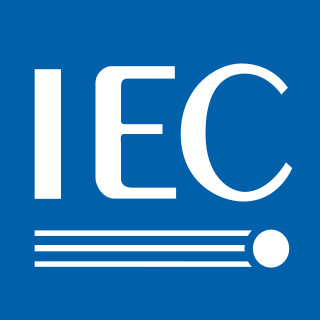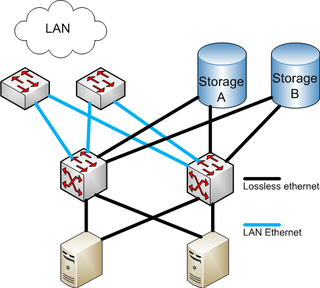
The American National Standards Institute is a private nonprofit organization that oversees the development of voluntary consensus standards for products, services, processes, systems, and personnel in the United States. The organization also coordinates U.S. standards with international standards so that American products can be used worldwide.
ANSI C, ISO C, and Standard C are successive standards for the C programming language published by the American National Standards Institute (ANSI) and ISO/IEC JTC 1/SC 22/WG 14 of the International Organization for Standardization (ISO) and the International Electrotechnical Commission (IEC). Historically, the names referred specifically to the original and best-supported version of the standard. Software developers writing in C are encouraged to conform to the standards, as doing so helps portability between compilers.

The International Electrotechnical Commission is an international standards organization that prepares and publishes international standards for all electrical, electronic and related technologies – collectively known as "electrotechnology". IEC standards cover a vast range of technologies from power generation, transmission and distribution to home appliances and office equipment, semiconductors, fibre optics, batteries, solar energy, nanotechnology and marine energy as well as many others. The IEC also manages four global conformity assessment systems that certify whether equipment, system or components conform to its international standards.

The Storage Networking Industry Association (SNIA) is a registered 501(c)(6) non-profit trade association incorporated in December 1997. SNIA has more than 185 unique members, 2,000 active contributing members and over 50,000 IT end users and storage professionals. The SNIA absorbed the Small Form Factor Committee.
ANSI INCITS 432-2007: Information technology - Fabric Application Interface Standard or FAIS is an application programming interface framework for implementing storage applications in a storage area network. FAIS is defined by Technical Committee T11 of the International Committee for Information Technology Standards.
ISO/IEC 27006 is an information security standard published by the International Organization for Standardization (ISO) and the International Electrotechnical Commission (IEC). Part of the ISO/IEC 27000 series of ISO/IEC Information Security Management System (ISMS) standards, it is titled Information technology - Security techniques - Requirements for bodies providing audit and certification of information security management systems.
ISO/IEC JTC 1, entitled "Information technology", is a joint technical committee (JTC) of the International Organization for Standardization (ISO) and the International Electrotechnical Commission (IEC). Its purpose is to develop, maintain and promote standards in the fields of information and communications technology (ICT).
ISO/IEC JTC 1/SC 22 Programming languages, their environments and system software interfaces is a standardization subcommittee of the Joint Technical Committee ISO/IEC JTC 1 of the International Organization for Standardization (ISO) and the International Electrotechnical Commission (IEC) that develops and facilitates standards within the fields of programming languages, their environments and system software interfaces. ISO/IEC JTC 1/SC 22 is also sometimes referred to as the "portability subcommittee". The international secretariat of ISO/IEC JTC 1/SC 22 is the American National Standards Institute (ANSI), located in the United States.

Fibre Channel over Ethernet (FCoE) is a computer network technology that encapsulates Fibre Channel frames over Ethernet networks. This allows Fibre Channel to use 10 Gigabit Ethernet networks while preserving the Fibre Channel protocol. The specification was part of the International Committee for Information Technology Standards T11 FC-BB-5 standard published in 2009.
ISO/IEC JTC 1/SC 27 Information security, cybersecurity and privacy protection is a standardization subcommittee of the Joint Technical Committee ISO/IEC JTC 1 of the International Organization for Standardization (ISO) and the International Electrotechnical Commission (IEC). ISO/IEC JTC 1/SC 27 develops International Standards, Technical Reports, and Technical Specifications within the field of information security. Standardization activity by this subcommittee includes general methods, management system requirements, techniques and guidelines to address information security, cybersecurity and privacy. Drafts of International Standards by ISO/IEC JTC 1 or any of its subcommittees are sent out to participating national standardization bodies for ballot, comments and contributions. Publication as an ISO/IEC International Standard requires approval by a minimum of 75% of the national bodies casting a vote. The international secretariat of ISO/IEC JTC 1/SC 27 is the Deutsches Institut für Normung (DIN) located in Germany.
ISO/IEC JTC 1/SC 36 Information Technology for Learning, Education and Training is a standardization subcommittee (SC), which is part of the Joint Technical Committee ISO/IEC JTC 1 of the International Organization for Standardization (ISO) and the International Electrotechnical Commission (IEC), that develops and facilitates standards within the field of information technology (IT) for learning, education and training (LET). ISO/IEC JTC 1/SC 36 was established at the November 1999 ISO/IEC JTC 1 plenary in Seoul, Korea. The subcommittee held its first plenary meeting in March 2000 in London, United Kingdom. The international secretariat of ISO/IEC JTC 1/SC 36 is the Korean Agency for Technology and Standards (KATS), located in the Republic of Korea.
ISO/IEC 9075 "Information technology - Database languages - SQL" is an international standard for Structured Query Language, and is considered as specifying the minimum for what a database engine should fulfill in terms of SQL syntax, which is called Core SQL. The standard also defines a number of optional features.
ISO/IEC JTC 1/SC 37 Biometrics is a standardization subcommittee in the Joint Technical Committee ISO/IEC JTC 1 of the International Organization for Standardization (ISO) and the International Electrotechnical Commission (IEC), which develops and facilitates standards within the field of biometrics. The international secretariat of ISO/IEC JTC 1/SC 37 is the American National Standards Institute (ANSI), located in the United States.
ISO/IEC JTC 1/SC 39 Sustainability for and by Information Technology is a standardization subcommittee of the Joint Technical Committee ISO/IEC JTC 1 of the International Organization for Standardization (ISO) and the International Electrotechnical Commission (IEC), that develops and facilitates standards within the field of sustainability and resource efficiency through Information Technology. The international secretariat of ISO/IEC JTC 1/SC 39 is the American National Standards Institute (ANSI), located in the United States.
Note: This special working group has been disbanded.
Note: This special working group has been disbanded. The work begun in ISO/IEC/JTC 1/SWG 5 on Internet of Things standardization gaps will be continued in ISO/IEC JTC 1/WG 10.
Note: This working group has been disbanded.
ISO/IEC JTC 1/SC 17 Cards and security devices for personal identification is a standardization subcommittee of the Joint Technical Committee ISO/IEC JTC 1 of the International Organization for Standardization (ISO) and the International Electrotechnical Commission (IEC), which develops and facilitates standards within the field of identification cards and personal identification. The international secretariat of ISO/IEC JTC 1/SC 17 is the British Standards Institution (BSI) located in the United Kingdom.
ISO/IEC 27040 is part of a growing family of International Standards published by the International Organization for Standardization (ISO) and the International Electrotechnical Commission (IEC) in the area of security techniques; the standard is being developed by Subcommitee 27 (SC27) - IT Security techniques of the first Joint Technical Committee 1 of the ISO/IEC. A major element of SC27's program of work includes International Standards for information security management systems (ISMS), often referred to as the 'ISO/IEC 27000-series'.
Storage security is a specialty area of security that is concerned with securing data storage systems and ecosystems and the data that resides on these systems.




